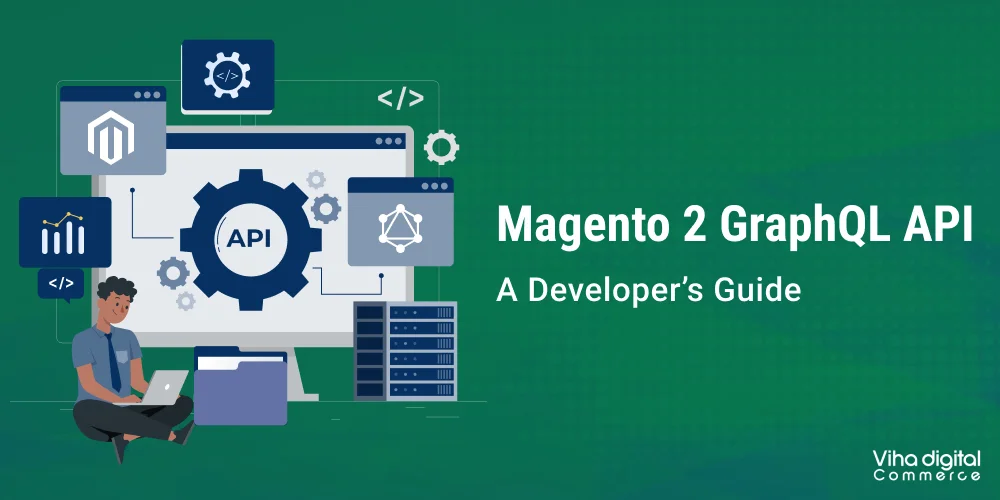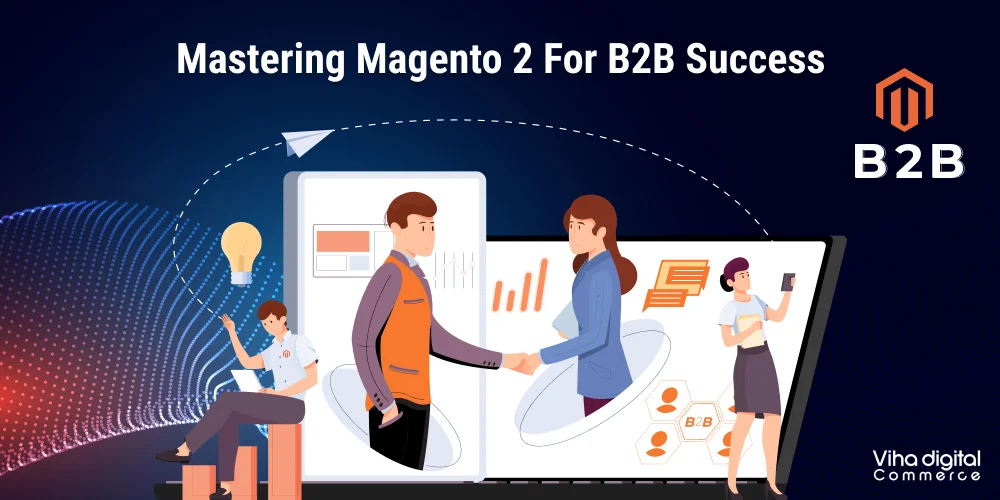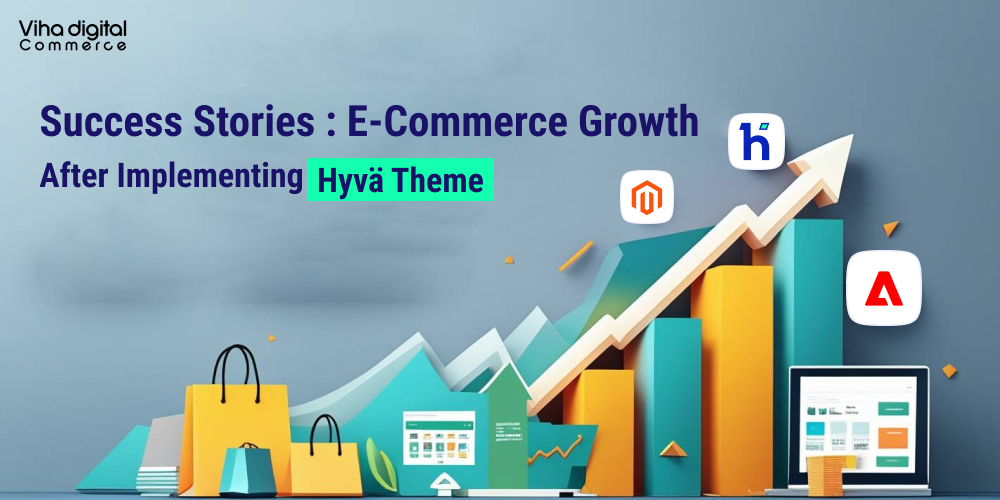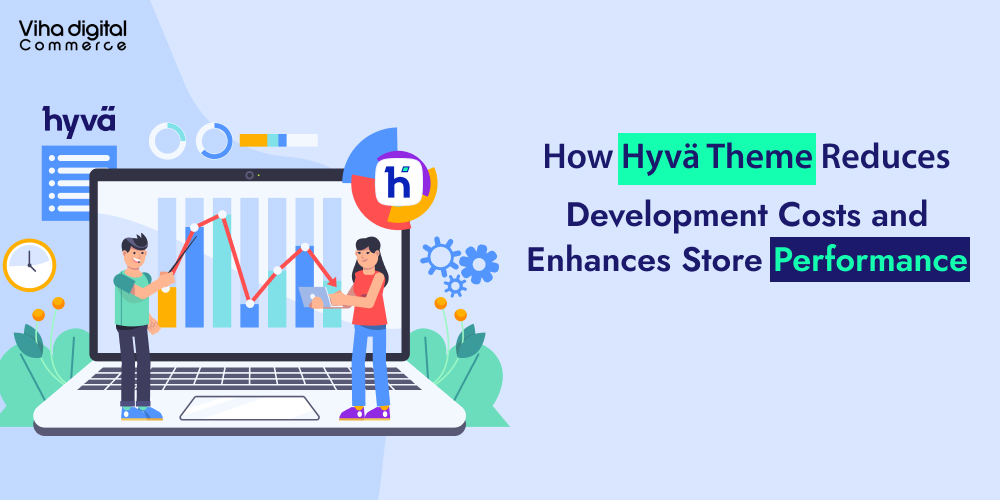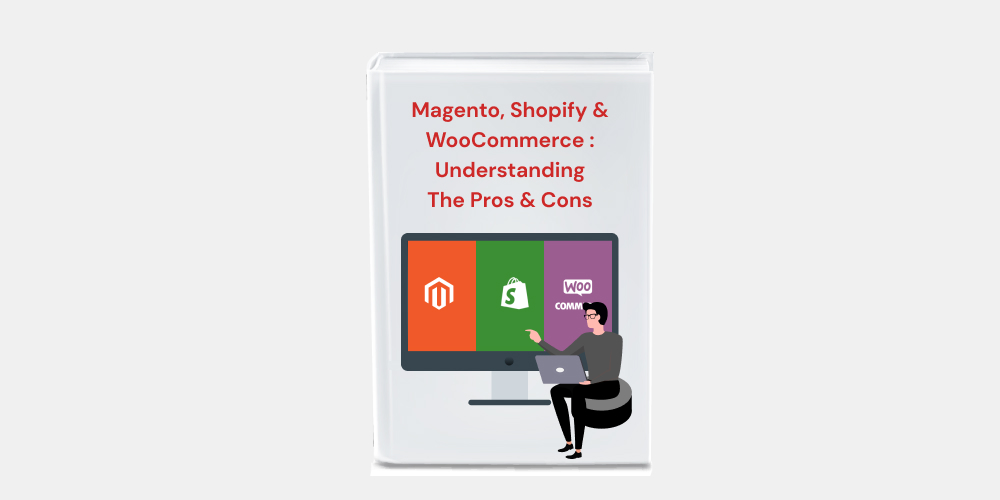
Magento, Shopify & WooCommerce : Understanding The Pros & Cons
It is critical to select the best E-commerce platform for creating, administering, and sustaining an online store. That might prove to be the determining factor in whether your company succeeds or fails in the future. Because small enterprises have limited funds and resources, this aspect is especially important.
Today we are going to discuss the top three choices available: Magento, Shopify, and WooCommerce. Each of them has distinct characteristics, strengths, and shortcomings. And we’ll show you all the specifics about these platforms, assisting you in selecting the best one for your company.
Overview:
Magento:
Magento CMS was introduced in March of 2008 and is now owned by Adobe. Magento is now used by over 700,000 websites throughout the world. 20th Century Fox, Olympus, and Time Out, for example, use Magento to power their online platforms companies.
Magento includes a variety of built-in features. You may easily switch between languages and foreign currencies, add coupons, generate thorough reports, offer discounts to certain products or returning customers, and so forth. Customers can post feedback and rate the products they buy.
Furthermore, Magento Open Source offers a diverse set of plugins and layouts. You can also modify the HTML or PHP code to reveal unique features for your store.
Furthermore, Magento allows you to construct several e-commerce sites and manage them all from a single admin panel. If you have multiple persons managing your online business, you can assign distinct tasks to programmers, managers, copywriters, and so on.
Pros:
- Several built-in features
- A sizable user and developer base
- Magento Connect has a plethora of extensions accessible.
- Magento commerce requires no coding knowledge.
- Several wonderful themes
- Viha Digital Solutions is just a click away for your needs pertaining to custom magento development services
Cons:
- There are numerous charges associated with opening your shop.
- Support is only available for those using the Magento Commerce solution.
- Because Magento is so huge, it is best to host it on a dedicated server.
- It is difficult and time-consuming to set up. But not with our custom magento development services.
Shopify :
You can create a working e-commerce store in under fifteen minutes using Shopify. The platform is subscription-based, with the Basic plan starting at $29 per month. It offers unlimited merchandise development, unlimited storage of data, vouchers for discounts, 24/7 support, two admin accounts, and much more.
Viha Digital Commerce offers amazing shopify migration services which can act as a catalyst for your business growth
Shopify integrates Google Analytics with a single click and has a private app store with a plethora of extensions. Shopify also integrates with popular email services like Avada and Mailchimp, as well as client email capture pop-up techniques.
Furthermore, Shopify is a tailored solution for small enterprises. Even if you have no plans for a digital hypermarket, you can still look for the best choice for your company. Shopify Lite enables you to reach out to clients through popular online channels that include Facebook, Tumblr, and Twitter. Customers can buy things over Facebook Messenger.
Pros:
- Social networking and WordPress blog integrations
- It is simple to open a store.
- Easy to migrate using our shopify migration services
- It is simple to obtain a custom domain name.
- Create an app store featuring a variety of apps.
- 24 hours a day, 7 days a week support
Cons:
- When a purchase is made, a transaction charge is required.
- The structure of URLs is not ideal for Search Engine Optimization.
WooCommerce :
WooCommerce is a WordPress e-commerce plugin. WooCommerce has emerged as the dominant e-commerce platform in terms of sales and ubiquity. WooCommerce is used by over 5 million websites. This is the ideal option for those who possess a blog powered by WordPress and wish to sell something.
WooCommerce is a free and open-source platform. As a result, you can add a personalized theme to your online shop or integrate certain commercial extensions to improve the functionality of your website.
You can sell real, digital, and affiliate goods using its built-in features. Ajax shopping cart, geolocation assistance, responsive layout, automatic shipping and tax computation, Google analytics integration, and search engine optimization are also included.
You can add sophisticated features such as product comparison, rapid browsing, pop-up notifications, alternative payment methods, and desired product listing if you use paid WooCommerce plugins. You may also publish your WooCommerce merchandise on Amazon, eBay, or incorporate Shopify’s Buy Now Button to make use of both platforms.
Pros:
- For large-scale internet businesses, advanced functionalities are available.
- Accounts for customers and store administrators are supported.
- There are numerous complementary and premium WooCommerce themes available.
- You get access to excellent useful wordpress plugins using our wordpress plugin development services
Customization options are numerous.
Cons:
- Because WooCommerce operates on an open-source platform, you may require some code experience at times.
- There is no help for anything maintenance-related, like web hosting or site security.
- Extra features might be costly for small enterprises.
Let’s indulge into a basic comparison across multiple important factors that you should consider while choosing a platform that best suits your requirements.
User Friendliness:
Magento
Magento is a little difficult to use. This platform does not provide on-site developers to help you build your website. To manage your Magento store, you will need to engage developers as well as a hosting service.
The learning curve for Magento is steep. If you choose this option, you must have a basic understanding of cloud web hosting, HTML, and so on.
Shopify
Shopify was ranked as one of the most straightforward-to-use platforms in the market by several store owners. Shopify offers a drag-and-drop site builder as well as other built-in features with a user-friendly interface to assist you in running and managing your business.
You can choose from ready-made designs, so no design abilities are required.
The themes use a layout that is responsive, which allows your website to be effectively adjusted to any screen size, including PCs, tablets, and smartphones.
Online payments are already set up for you. It is not necessary to deal with confidential credit card information. You can also sell your products to those who are your Facebook contacts.
WooCommerce
Before you can use WooCommerce, you must first implement the following:
- Do you have a domain name?
- Sign up for a hosting account.
- WordPress should be installed.
- Set up a WordPress theme
Only when you have completed the preceding steps can you deploy the WooCommerce plugin on your website powered by WordPress. You can employ a WordPress hosting firm to manage your domain and WordPress setup. You are just responsible for the WooCommerce component.
You’ll see the on-screen setup process upon the installation and activation of the WooCommerce plugin on your website. It enables you to choose the major shop parameters and fine-tune everything. Currency options, payment methods, tax, and shipping are just a few of the crucial processes.
When the installation is complete, you may start utilizing your shop and adding items.
Speed, Scalability & Performance :
Magento
Magento 2.0 has a comprehensive set of performance as well as scalability enhancements, including:
Web pages should be optimized for faster delivery.
Improve the effectiveness of backend processes by increasing the response time of the server for all website actions.
Improve database flexibility and scalability to deal with elevated loads
Shopify
Shopify performs admirably in terms of website speed and performance.
Meanwhile, Shopify’s scalability might present an issue as your store grows. If you desire smooth scalability, Shopify Plus is a good option. This technology was able to handle over 200,000 concurrent browsers while operating the Kylie Cosmetics website.
WooCommerce
WooCommerce permits scalability, but users without sophisticated coding abilities might find it difficult to scale their retail sites to meet their needs.
Security :
Magento
With sufficient developers and hosting options, security with Magento won’t be a problem. It consistently releases security updates and prompt notifications to inform retailers of security issues.
There are also numerous Magento security extensions available. They can reinforce passwords, check for vulnerabilities, examine changed files, and anticipate restrictions or dangers.
Shopify
Shopify takes care of all security measures. As a result, you don’t need to fret about obtaining an SSL certificate or being hacked.
Shopify includes a free SSL certificate. SSL stands for Secure Sockets Layer, and it normally provides you with everything you need to safeguard the integrity of your site and prevent data leaks. Shopify’s built-in SSL ensures that whenever someone visits your site, they will see a tiny padlock symbol near your URL.
This certificate assists you in ensuring security when managing confidential information and payments from customers. Furthermore, your clientele can feel secure when viewing your website.
Furthermore, Shopify is completely PCI-DSS certified, allowing your site to take any credit card purchases in accordance with the most recent standards. You can start accepting credit and debit cards right away.
WooCommerce
Because WooCommerce is a self-hosted system, unlike Shopify, you must handle its security. To obtain an SSL certificate, you may want the assistance of a hosting provider.
WordPress, on the other hand, is constantly updated for cybersecurity and bug fixes. Its staff is continually monitoring and changing the code in order to mitigate any dangers.
Flexibility in Design Customization:
Magento
Magento comes with two default themes: Blank, which serves as a foundation for custom theme development, and Luma, which serves as a demonstration theme. These themes are built on a design that is responsive to optimize the appearance of your storefront across numerous devices.
Furthermore, Magento offers 16 other ready-to-use themes for your online shop on its marketplace, with prices ranging from $0 to $499. Alternatively, you can visit ThemeForest, Magenest, and Template Monster to find additional feature-rich design options for this platform.
Because Magento is open-source, you have access to an infinite number of customization possibilities for your store’s appearance. You can freely tweak everything or create your own themes without being restricted to a specific level of integration.
Shopify
High-quality themes are one of Shopify’s strongest selling features. Users may easily download and use Shopify themes to boost their store.
In its theme store, Shopify presently provides over 70 different themes. These themes are mobile device oriented and offer a wide range of company kinds with different color options. As a result, users can select a theme that corresponds to the peculiarities of their business.
The platform’s customization capabilities are limited due to Shopify’s proprietary codebase. Nonetheless, you may use Shopify’s proprietary “Liquid” language to improve the look of your store while making your brand distinguish from the crowd.
WooCommerce
WooCommerce users have complete control over their personalization. All plugins, themes, and extensions can be customized and written to improve the look and functionality of your website. This gives you more control over the appearance of your site and allows you to integrate unique features to match the needs of your business. To make your site more appealing, you can personalize the WooCommerce product gallery, store page, website header, and so on.
SEO Friendliness:
Magento
Magento is frequently regarded as an exceptionally robust eCommerce solution for SEO. The platform provides numerous fantastic functions and extensions to firms in order to improve their SERP ranking rate.
Magento, being an open-source solution, allows users to freely alter their shop’s look and SEO capability. You can, for example, optimize picture alt-tags, permalinks, preset meta tags, product descriptions, and even prohibit search engines from indexing pages.
There are also some fantastic features, including no-follow links, Google sitemaps, redirects, and canonical tags. This allows search engines to crawl and understand your online store’s structure.
Mageplaza also provides a variety of complex SEO plugins, like the All in One SEO Suite.
Shopify
Shopify offers a minimal set of SEO capabilities to help store owners optimize their store-level content for higher SERP rankings. You can, for example, change meta tags, add alt text to photographs, build 301 redirects and an auto XML sitemap, and so on. Surprisingly, this platform provides an SSL certificate for your shop’s checkout as well as any content housed on your site.
The Canadian e-commerce platform is also well-known for its fast loading speed, which significantly improves the user experience.
When it boils down to content marketing, Shopify has an outstanding blog with features that includes easy-to-set tags, various authors, and customizable SEO settings.
WooCommerce
WooCommerce, as a WordPress plugin, has access to all of WordPress’ SEO features. It allows you to update, generate content, and add meta information to ensure that your items’ keywords rank high on SERPs.
WordPress also has a plethora of powerful SEO plugins, which include Yoast SEO. You may improve your shop by utilizing this plugin’s incredible SEO functions, such as adding multiple focus keys per page, URL redirects, and real-time suggestions.
3rd Party Add ons & Integrations :
Magento
It might be said that among eCommerce platforms, Magento has the most potent marketplace. You may greatly increase and expand the functionality of your online business thanks to the roughly 6,000 free as well as paid extensions that are available on its marketplace.
In every area, including content and customization, accounting and finance, payments and security, site efficiency, marketing, and customer support, etc., the Magento marketplace provides solutions.
Shopify
When it comes to apps and expansions, Shopify provides thousands of alternatives that are both free and paid. Notably, you only need to click a button to integrate the majority of plugins. These provide you the ability to accomplish items like trust icons which reduce the likelihood of cart abandonment or social buttons that boost your chances of connecting with a community.
WooCommerce
WordPress served as the foundation for WooCommerce. Users can access more than 56,000 WordPress plugins with this. There are 400 or so extensions specifically designed for WooCommerce. Apart from that, we have apt infrastructure and expertise in wordpress plugin development
These add-ons might help you customize your website to meet the needs of your particular industry. Payment gateways, SEO, generating leads, marketing, navigating, and usability are all acceptable inclusions. Additionally, you can pay a programmer to create a plugin for your online store.
Conclusion :
After analyzing a few aspects of various e-commerce platforms, the following conclusions can be made:
The best solution for small stores expanding their online presence is Shopify.
WooCommerce effectively supports small and medium-sized businesses.
For large businesses with enough resources, Magento is an excellent option.
To decide which platform is best for both your company type and your long-term objectives, you must weigh all of its features.
Having discussed the comparison of basic advantages and disadvantages of all three platforms, If you feel like you need a professional Ecommerce development agency to handle everything from scratch to deployment, Get in touch with us now or visit our website!
